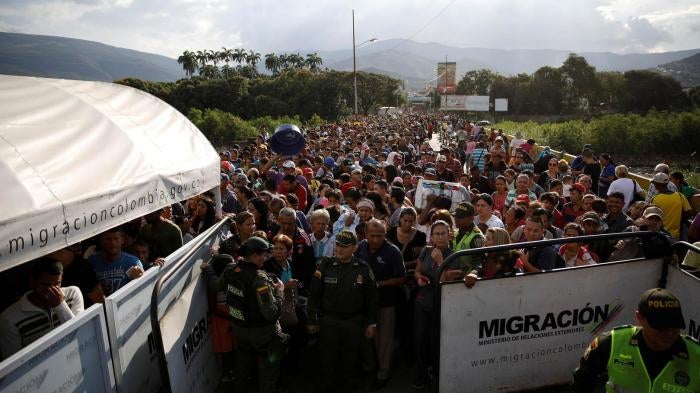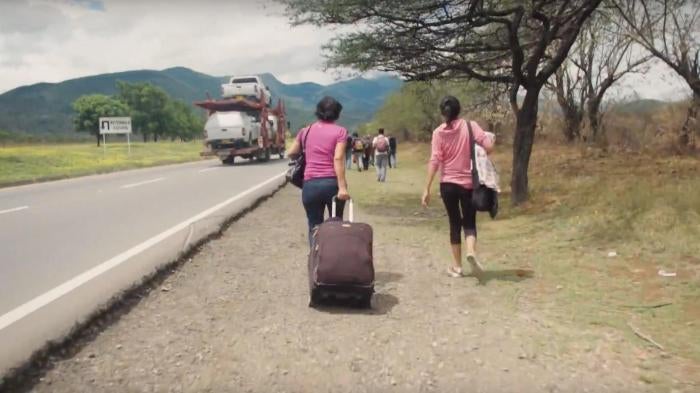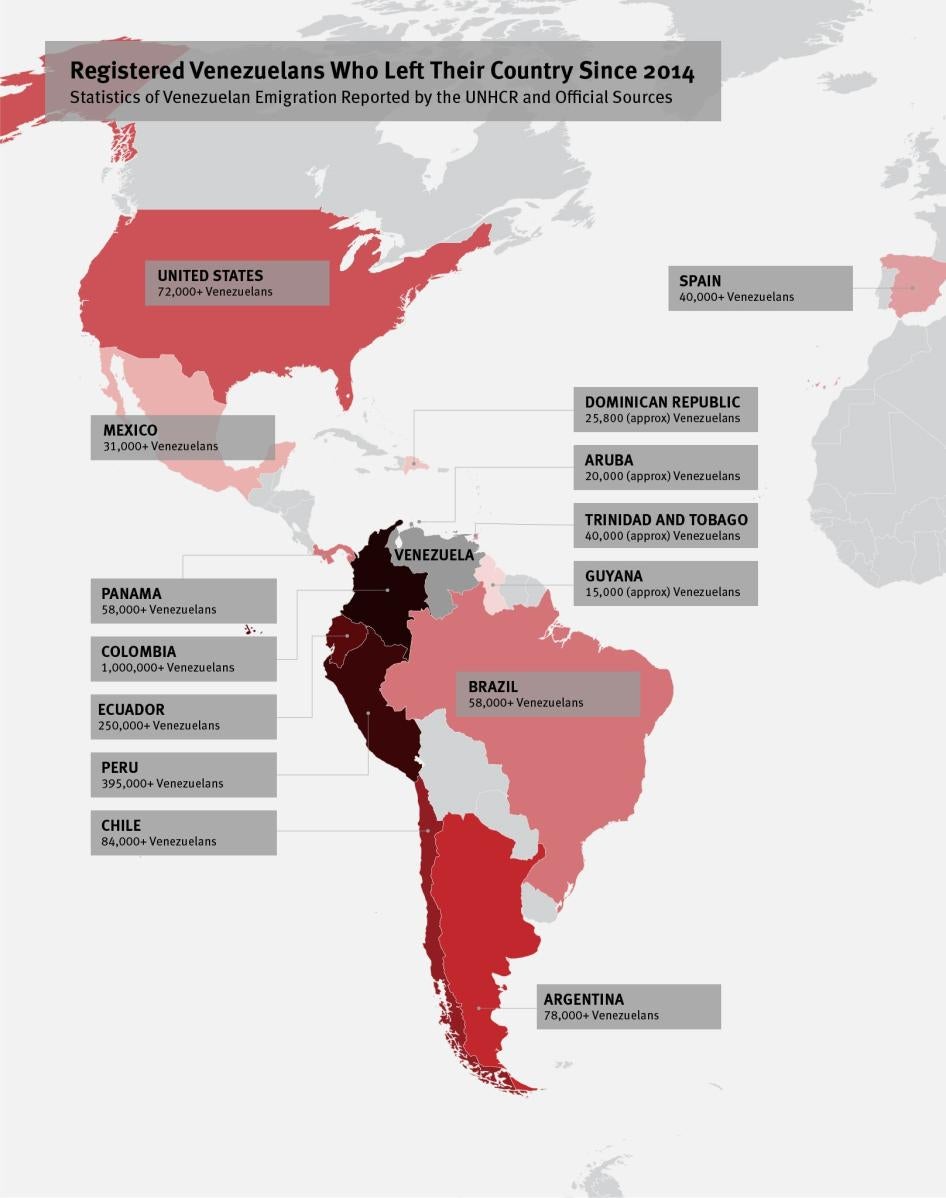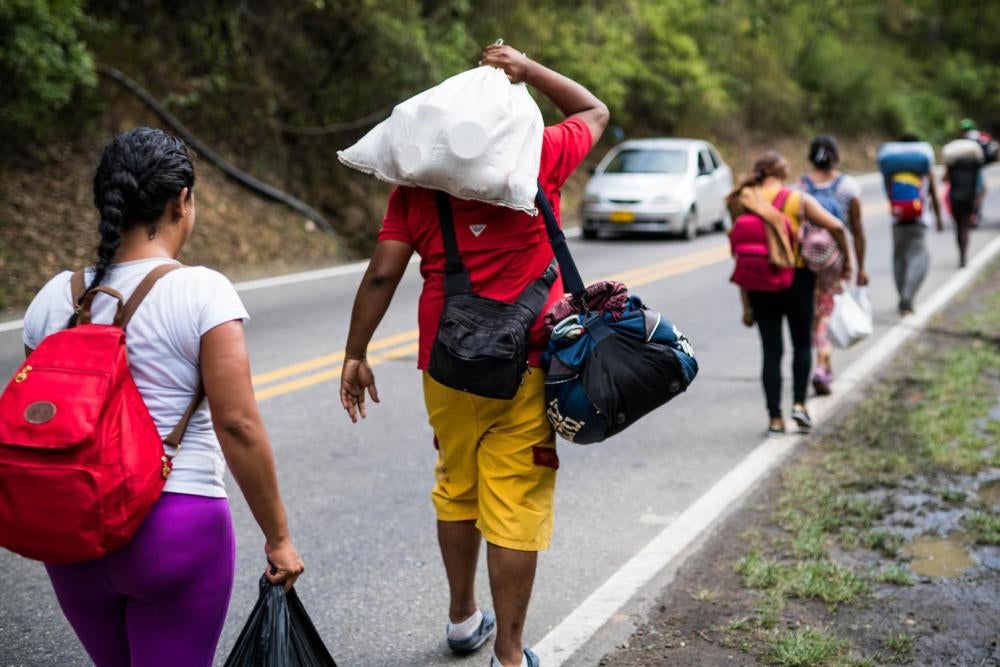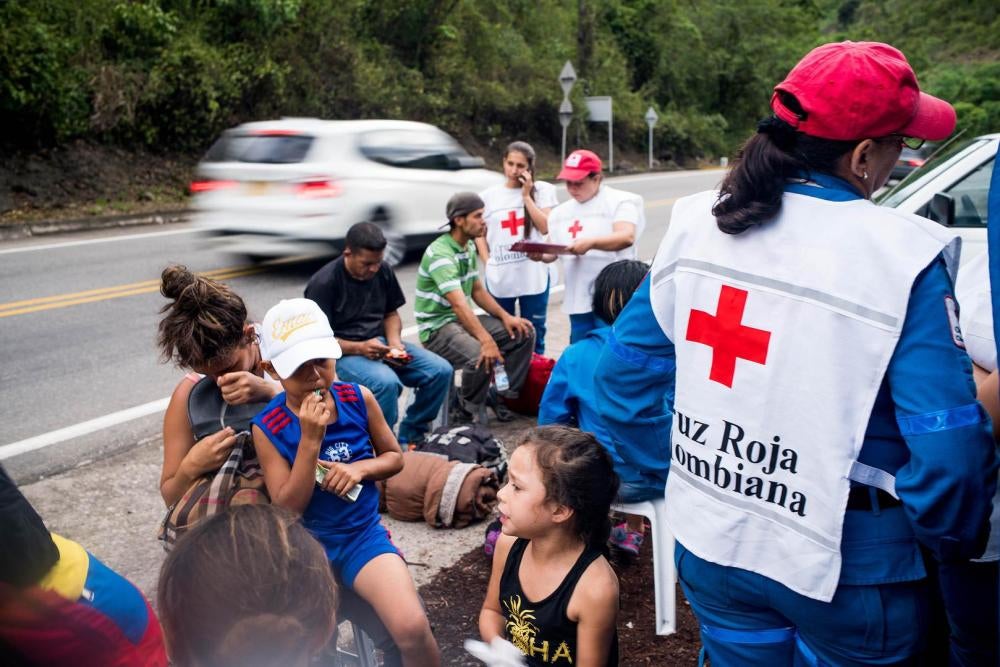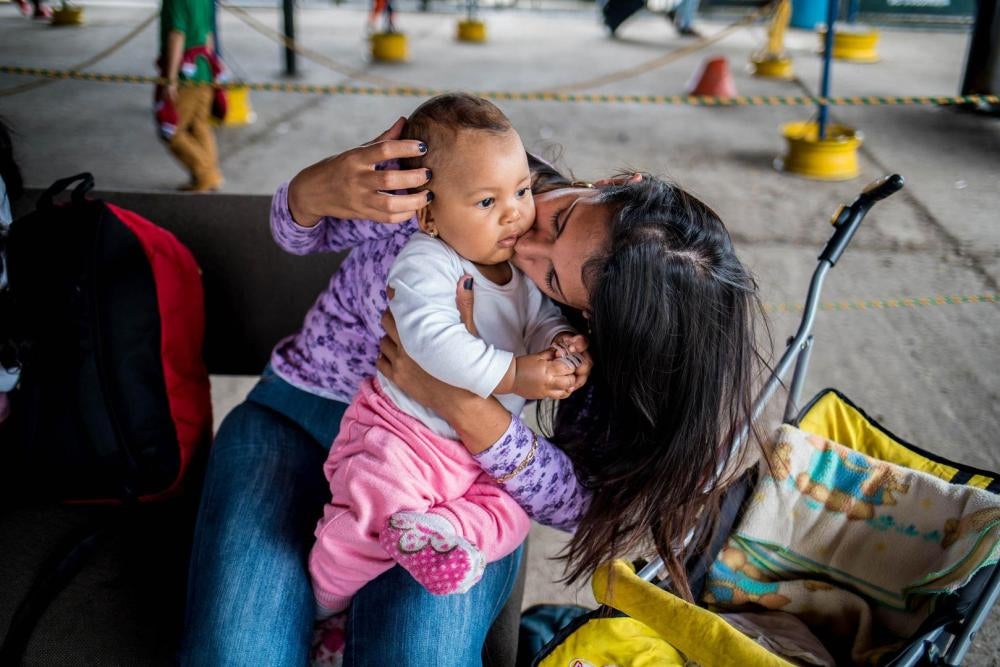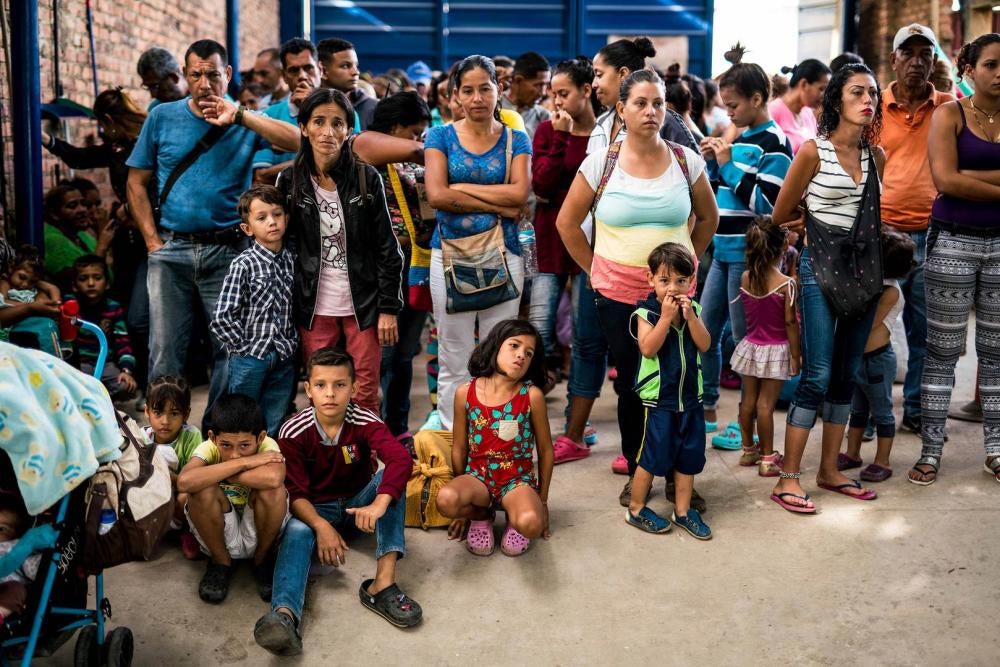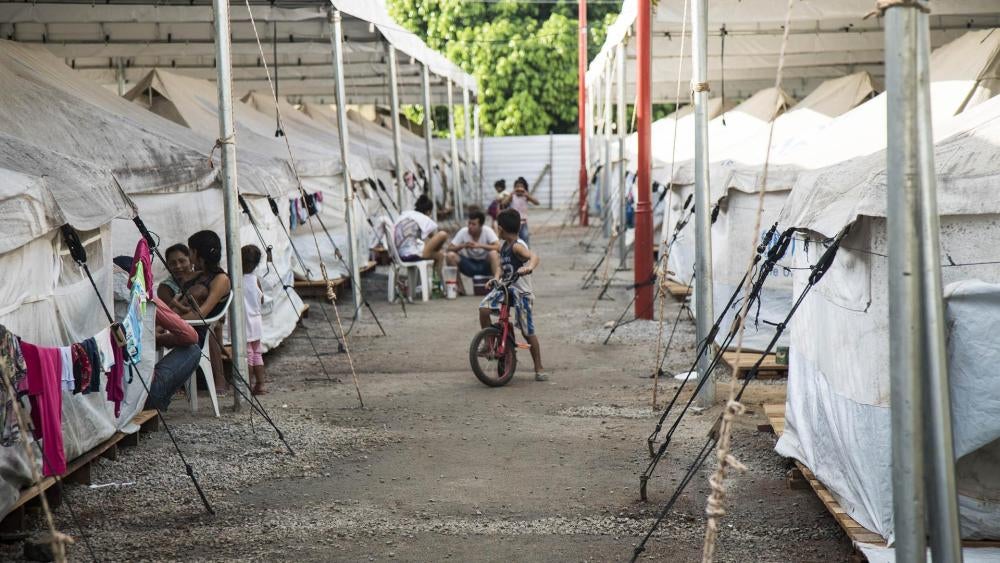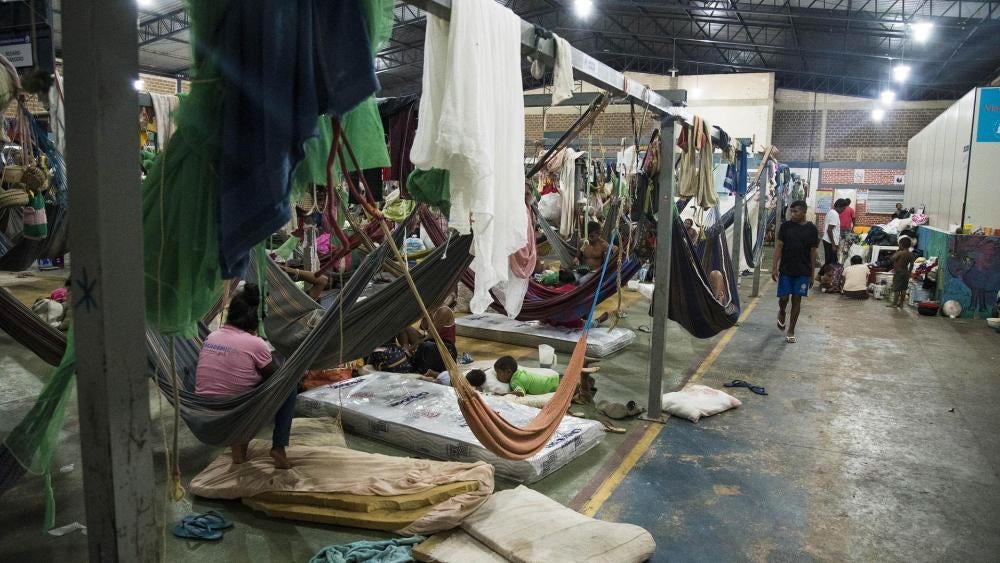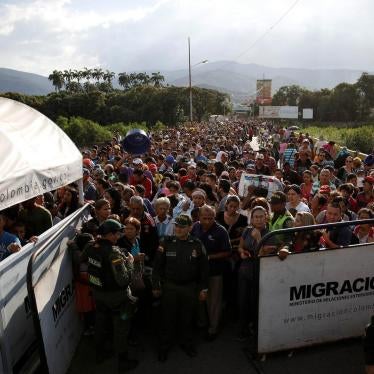Summary
The current exodus of Venezuelans has generated the largest migration crisis of its kind in recent Latin American history. More than 2.3 million Venezuelans have left their country since 2014, according to the United Nations, and many others have left whose cases have not been registered by authorities.
Venezuelans are fleeing their country for multiple reasons. Severe shortages of medicine, medical supplies, and food make it extremely difficult for many families to have access to the most basic health care and to feed their children. A ruthless government crackdown has led to thousands of arbitrary arrests, hundreds of prosecutions of civilians by military courts, and torture and other abuses against detainees. Arbitrary arrests and abuses by security forces, including by intelligence services, continue. Extremely high rates of violent crime and hyperinflation are also key factors in many people’s decision to leave the country.
This report provides an overview of where the more than 2 million Venezuelans who have left the country since 2014, at least half of them in the past year and a half alone, are now living, the conditions they face, their prospects of obtaining legal status in the host countries, and applicable international standards that should guide host governments’ responses.
Given the scale and complexity of Venezuelan migration within the region, governments should come together to adopt a collective and concerted response to it. In particular, governments should consider adopting:
- A region-wide temporary protection regime that would grant all Venezuelans legal status for a fixed period of time, at least pending adjudication of their individual claims for protection;
- A regional mechanism to distribute both financial costs, and the actual hosting of Venezuelans fleeing their country, on an equitable basis; and
- Strong multilateral strategies to address the root causes that lead so many Venezuelans to flee their country, including adopting and enforcing targeted sanctions such as asset freezes and cancelling visas against key Venezuelan officials implicated in serious human rights abuses, and pushing for accountability for human rights violations.
***
The massive flow of people leaving Venezuela is one of the major challenges that governments in the Americas face today. Over the past two years, many of these governments have made exceptional efforts to welcome Venezuelans fleeing persecution, violence, and severe material deprivation. More recently, however, some countries have been shifting to a harder line, making it more difficult for Venezuelans to apply for legal status. Some of these moves could put the rights of Venezuelan asylum seekers in jeopardy. Recent incidents of xenophobic violence, and a climate that threatens to give rise to more of those attacks, are also a growing concern.
The political, economic, human rights, and humanitarian crisis in Venezuela creates a mix of factors that cause Venezuelans to leave the country and makes them unable or unwilling to return. Some of these factors alone may qualify a person for refugee status, while for some others the cumulative impact of various factors could give rise to a valid claim for refugee status. In other cases, individuals fleeing Venezuela may not be able to claim refugee status but would face severe hardship if returned to Venezuela and are in urgent need of humanitarian assistance in the countries to which they have migrated.
Under the terms of the 1951 Refugee Convention, refugee status is contingent on a well-founded fear of persecution based on racial, religious, political or certain other grounds. In Latin America, however, non-binding regional norms as well as the domestic laws of some states embrace a broader eligibility for asylum. In particular, 15 regional states have incorporated the 1984 Cartagena Declaration, which provides guidance to Latin American states in developing their refugee protection frameworks, into domestic law. In addition to their obligations under the Refugee Convention, these governments also cannot forcibly return people to their country of origin if they meet the Declaration’s criteria for refugee status.
Of particular relevance to the situation in Venezuela, the Cartagena Declaration includes as refugees people fleeing “massive violation of human rights or other circumstances which have seriously disturbed public order.” The United Nations High Commissioner for Refugees (UNHCR), when interpreting the meaning of the clause “other circumstances which have seriously disturbed public order” noted that this phrase “is the least frequently applied by national adjudication bodies when determining refugee claims under the Cartagena refugee definition.” States need to carefully consider, in some cases without much in the way of domestic precedent to draw on, the extent to which their laws give rise to valid claims of protection by Venezuelans who have fled the country for humanitarian reasons rooted in the ongoing crisis. In a preliminary ruling, a Brazilian Supreme Court judge recently ruled that incorporating the expanded definition of the Cartagena Declaration into domestic law generates a “duty of humanitarian protection” with regard to Venezuelans seeking refuge in Brazil.
For its part, the UNHCR has argued that “the broad circumstances leading to the outflow of Venezuelan nationals fall within the spirit of the Cartagena Declaration.” In addition, UNHCR has stated that while not all Venezuelans left for refugee-related reasons, “it is becoming increasingly clear that a significant number [of Venezuelans] are indeed in need of international protection,” and are now unable or unwilling to return.
Some South American governments, despite daunting challenges, have made considerable efforts to welcome Venezuelans, including adopting special rules to provide them legal permits to stay, in addition to the possibility of seeking asylum. These permits have provided legal status to hundreds of thousands of Venezuelans, helping them establish themselves abroad, work, and gain access to basic services. Yet sometimes Venezuelans have reported difficulties in getting these permits, because of prohibitive costs or requirements to present documents that they could not bring from Venezuela and are unable to obtain from abroad.
However, some of these governments have recently adopted measures that make it, in practice, extremely difficult to obtain these permits. For example, Chile, Peru and Ecuador announced they would require Venezuelans to present passports to apply. This is ostensibly a measure to ensure that governments are able to verify the identity of Venezuelans seeking legal status. Although Peru and Ecuador partially backtracked after the announcements generated a strong reaction, it is important to note that such measures ultimately represent a hurdle that would prove insurmountable for many. For the average Venezuelan, obtaining a passport in Venezuela is very difficult and may sometimes take up to two years.
Moreover, hundreds of thousands of Venezuelans remain in an irregular situation, which severely undermines their ability to obtain a work permit, send their children to school, and access health care. This makes them more vulnerable to labor and sexual exploitation, and human trafficking, as well as less likely to report abuses to competent authorities.
In the Caribbean, where several governments have close economic and political ties to the Venezuelan government, no country has officially adopted a special permit for Venezuelans to legally stay and most of the countries do not have laws to regulate the asylum-seeking process in general. In some cases, Venezuelans with UNHCR-issued asylum certificates have been detained or deported to Venezuela. Some Venezuelans seeking refuge in Caribbean countries and Brazil have also been victims of xenophobic harassment.
In July and August 2018, Human Rights Watch conducted research missions to the Colombian-Venezuelan and Brazilian-Venezuelan borders, where we interviewed United Nations and government officials and dozens of Venezuelans who had crossed the border. The report is also based on additional interviews conducted by Human Rights Watch via telephone, email, Skype, and text messaging services with Venezuelans who have recently fled their country, as well as lawyers, experts, and activists who monitor the situation of Venezuelan immigration in South American countries and the Caribbean. Unless noted otherwise, the information in the report is based on Human Rights Watch interviews with experts with knowledge of conditions in the respective countries; all of the experts asked to remain anonymous. It is also based on a thorough review of official information published by government authorities and the UNHCR.
The Scope of Venezuelan Emigration
According to the United Nations, more than 2.3 million Venezuelans left Venezuela between 2014 and 2017.[1] However, given the number of Venezuelans who leave their country through irregular border crossings, and those who have not yet been able to obtain legal status, it is likely that many more have left in recent years. The total Venezuelan population is estimated to be around 32 million.
According to UNHCR, over 298,000 are asylum seekers and more than 567,000 obtained other forms of legal stay in various countries, which means that the rest—over one million Venezuelans—remain in an irregular situation.[2]
Where are Most Venezuelans Who Left Living Now?
The countries that have received the largest numbers of Venezuelans since 2014 are:
- Colombia: An estimated 1 million people moved from Venezuela to Colombia and stayed in the country between March 2017 and June 2018, according to a Colombian government report. Colombian authorities reported then that the number included 442,000 Venezuelans in the country without legal permission, 376,000 with legal status, and 250,000 Colombians who had been in Venezuela but returned to Colombia.[3] (The Colombian government has since given legal permits to stay to the 442,000 Venezuelans who had registered with the government). The actual number of Venezuelans in Colombia is likely to be much higher, given that many cross through the more than 270 unofficial crossings along the border.
- Peru: An estimated 395,000 Venezuelans are living in Peru.[4] More than 126,000 Venezuelans are seeking asylum in Peru, the largest number of registered Venezuelan asylum seekers in any country. In addition, 46,200 Venezuelans have benefited from a special temporary permit.[5]
- Ecuador: An estimated 250,000 Venezuelans have arrived in Ecuador.[6] At least 83,400 obtained a residency permit or visa, and more than 7,100 sought asylum.[7]
- Chile: More than 84,400 Venezuelans had received legal permits to live in Chile as of December 2017.[8]
- Argentina: Nearly 78,000 had received legal permits to live in Argentina as of May 2018, and over 400 sought asylum as of June.[9]
- United States: There are more than 72,700 Venezuelan asylum seekers in the United States as of June 2018.[10] Note that this number represents cases, not individuals, so the number of people represented by this figure is undoubtedly larger.
- Panama: More than 7,100 Venezuelans have sought asylum and 51,400 sought alternative legal stays in Panama as of March 2018.[11]
- Brazil: More than 32,700 Venezuelans had sought asylum and an additional 25,300 had obtained another legal permit to stay in Brazil as of April 2018.[12]
- Mexico: Nearly 25,000 Venezuelans had legal permits to stay as of April 2018, and an additional nearly 6,900 were asylum seekers as of July.[13]
- Southern Caribbean countries: Approximately 98,500 Venezuelans are living in the southern Caribbean—the largest numbers in Trinidad and Tobago (40,000), Aruba (20,000), and Guyana (15,000).[14]
- Dominican Republic: There are approximately 25,800 Venezuelans living in the country, according to an official government survey.[15]
The number of Venezuelan applicants for international protection in the European Union increased from 325 in 2014 to 11,980 in 2017.[16] In April 2018, Venezuela appeared for the first time in the list of top five countries of origin of asylum applicants in the EU. During that month, 2,324 Venezuelans filed applications for international protection in the European Union, a 62 percent increase from March. In June, Venezuelan applicants lodged fewer applications than in May (when 3,070 were lodged), but applications were still at a much higher level than at the beginning of the year. [17] Venezuelans had a very small share of repeat applications, which suggests that they tended to be newly arrived in the European Union.
In 2016 and 2017 alone, more than 40,000 Venezuelans arrived in Spain, where the largest number of Venezuelans have arrived in Europe.[18] In those years, more Venezuelans filed asylum requests than nationals of any other country. According to official statistics, 10,350 Venezuelans requested asylum in 2017—up from 3,960 in 2016 and 596 in 2015.[19] More than 26,000 Venezuelans have sought asylum in Spain since 2014.[20]
Applicable International Refugee Law
Some Venezuelans may qualify as refugees under the definition of the 1951 Refugee Convention. Some others may be considered refugees under the broader refugee definition included in the Cartagena Declaration, which has been incorporated into the legal framework of 15 countries in the region.
Under the 1951 Refugee Convention and its 1967 Protocol, a refugee is defined as anyone who, “owing to well-founded fear of being persecuted for reasons of race, religion, nationality, membership of a particular social group or political opinion, is outside the country of his nationality and is unable or, owing to such fear, is unwilling to avail himself of the protection of that country; or who, not having a nationality and being outside the country of his former habitual residence as a result of such events, is unable or, owing to such fear, is unwilling to return to it.”[21]
The right not to be forcibly returned under these circumstances is called the principle of nonrefoulement. The American Convention on Human Rights, the UN Convention against Torture and Other Cruel, Inhuman or Degrading Treatment (CAT), the International Covenant on Civil and Political Rights (ICCPR), the Convention on the Rights of the Child (CRC), and the European Convention on Human Rights (ECHR), as well as customary international law, include nonrefoulement protections.[22]
The Cartagena Declaration of 1984, while not a binding legal instrument, has provided influential normative guidance in developing the international refugee protection framework in Latin America. The Cartagena Declaration embraces a broader definition of refugee that includes “persons who have fled their country because their lives, safety or freedom have been threatened by generalized violence, foreign aggression, internal conflicts, massive violation of human rights or other circumstances which have seriously disturbed public order” (emphasis added).[23]
This provision of the declaration is of obvious potential relevance to the situation in Venezuela, but there is a dearth of legal precedent to guide states in interpreting and applying it. The UNHCR, when interpreting the meaning of the clause “other circumstances which have seriously disturbed public order” noted that this phrase “is the least frequently applied by national adjudication bodies when determining refugee claims under the Cartagena refugee definition.” UNHCR has however maintained that in applying an analogous clause included in the OAU Refugee Convention in Africa, a “lack of food, medical services and supplies” should be taken as “factual indicators” of the existence of “events seriously disturbing public order.”[24]
Although the Cartagena Declaration is non-binding, its refugee definition has been incorporated into the national laws or practices of 15 countries in the region: Argentina, Belize, Bolivia, Brazil, Chile, Colombia, Ecuador, El Salvador, Guatemala, Honduras, Mexico, Nicaragua, Paraguay, Peru, and Uruguay.[25]
In an August 2018 preliminary ruling, a Brazilian Supreme Court judge ruled that Brazil has bound itself to respect the Cartagena Declaration’s expanded refugee definition by incorporating it into domestic law, which now recognizes as refugees “those who are forced to leave due to grave and generalized human rights violations.” The ruling, which explicitly discussed Venezuelans seeking protection in Brazil, concluded that “the expansion of the concept of refugee generates, for the State, a duty of humanitarian protection.”[26]
UNHCR has stated that “it is becoming increasingly clear that a significant number are indeed in need of international protection.”[27] UNHCR considers that “the broad circumstances leading to the outflow of Venezuelan nationals would fall within the spirit of the Cartagena Declaration, with a resulting rebuttable presumption of international protection needs.”[28]
In a resolution published in March 2018, the Inter-American Commission on Human Rights (IACHR), an authoritative body that interprets regional human rights standards, urged Organization of America States (OAS) members to adopt a series of measures in response to massive Venezuelan immigration to the Americas.[29] These include:
- Guaranteeing refugee status to Venezuelans with a well-founded fear of persecution in case of return to Venezuela, or who consider that their life, integrity, or personal freedom would be threatened due to the violence, massive violations of human rights, and serious disturbances of public order, under the terms of the Cartagena Declaration;
- Respecting the principle of nonrefoulement of Venezuelans in danger of persecution or other serious violations of human rights, which the Commission interprets to include serious risk to their health or life due to medical conditions, in accordance with a broad interpretation of the definition of refugee in the Cartagena Declaration.
- Expanding regular, safe, accessible, and affordable channels for migration through the progressive expansion of visa liberalization and easily accessible visa facilitation regimes or other measures to legally stay in the country, taking into account the need for these mechanisms to be economically accessible and ensure access to Venezuelans who may not have all required documentation for reasons beyond their control;
- Providing humanitarian assistance to Venezuelans within national jurisdictions;
- Guaranteeing access to the right to nationality for stateless people, as well as for children of Venezuelans born abroad who are at risk of being stateless; and
- Carrying out positive measures such as educational and awareness campaigns to fight discrimination and xenophobia.
Similarly, the UNHCR issued a Guidance Note on the outflow of Venezuelans that encourages countries to consider, in addition to granting asylum to Venezuelans, the creation of “protection-oriented arrangements to enable legal stay for Venezuelans.” These arrangements should be provided by law; accessible to all Venezuelans irrespective of when they arrived in the country, with minimal or no cost; and guarantee access to basic services and fundamental rights, including access to health care, education, and shelter, freedom of movement, and family unity.[30]
The political, economic, human rights, and humanitarian crisis in Venezuela creates a mix of factors that cause Venezuelans to leave and that make them unable or unwilling to return. Some of these alone may qualify a person for refugee status, while for others the cumulative impact of various factors could give rise to a valid claim for refugee status. Whether one qualifies under the 1951 Refugee Convention definition or under the Cartagena standard in jurisdictions where that definition is applied, refugee status would be the same with all the rights that attach to it, including the right not to be forcibly returned to the country of origin.
Since relatively few Venezuelans outside their country have had their status as refugees under the 1951 Refugee Convention or the Cartagena Declaration definition recognized, many are living without any legal status or with various temporary or special statuses that are not explicitly linked to a need for international protection. It should also be noted that refugee status does not depend on legal presence in the receiving country or even on formal recognition. A person is a refugee when they fulfill the refugee definition. Recognition of one’s refugee status does not make a person a refugee, but is simply the formal recognition of a status they are entitled to.
Major Difficulties that Venezuelans Abroad are Facing
A first difficulty for many is finding the means to leave Venezuela, which they sometimes do with limited resources and through clandestine, dangerous border crossings.[31] Once Venezuelans are outside their country, an important difficulty for many is obtaining legal permits to stay in the countries where they are living.
Hundreds of thousands of Venezuelans who have left the country remain in an irregular situation in the countries where they are now living. Their precarious status severely undermines their ability to obtain a work permit, send their children to school, or get health care. Even some with legal permits to stay cannot fully exercise their fundamental rights. Their irregular situation makes them more vulnerable to labor and sexual exploitation, and human trafficking, and less likely to report abuses to competent authorities, according to the Inter-American Commission on Human Rights and several interviews conducted by Human Rights Watch.[32]
There have also been credible reports of xenophobic and discriminatory practices against Venezuelans by multiple sources in several countries, including abuses by authorities and individuals, extortion, and rhetoric that stigmatizes Venezuelans, blaming them for increased rates of violence in the countries where they have arrived and accusing them of taking jobs away from nationals.[33]
For example, in addition to xenophobic practices described in the next chapter suffered by Venezuelans in some Caribbean islands, there have been some isolated xenophobic incidents in Brazil.
In March 2018, residents in Roraima state —which shares the border with Venezuela— organized several demonstrations against Venezuelan immigrants. During a protest in Macajaí, in Southern Roraima, organized after a Venezuelan was accused of killing a Brazilian citizen, Brazilian demonstrators expelled Venezuelans —including women and children— from an abandoned building that they had taken over to live in. The demonstrators destroyed and set on fire some of the Venezuelans’ belongings, according to press reports.[34] Brazilian authorities have opened investigations into this incident, as well as into messages that incited racism and xenophobia published in social media.[35]
In August 2018, residents of Pacaraima, the Brazilian town that borders with Venezuela, attacked Venezuelans living on the street, beat them, set their personal belongings on fire, and threatened them. This took place following a protest against Venezuelan immigration that occurred after a Brazilian man had been robbed, allegedly by Venezuelans. Several Venezuelans told Human Rights Watch that they and others ran away during the attack; some sought shelter in a church and others at a federal government building or a federal police checkpoint. More than 1,200 Venezuelans returned to Venezuela after the incident, including some that may have been asylum seekers, according to a local prosecutor. The police did not intervene to stop the violence or arrest those who were attacking the Venezuelans.[36]
Legal Avenues to Stay and Obstacles to Pursuing Them
Central and South America
In addition to the possibility of applying for asylum, several governments in South America have adopted various measures to provide Venezuelans with legal permits to stay in their countries. For example, Colombia, Peru, Brazil, and Chile have created a special permit for Venezuelan immigrants.[37] Argentina and Uruguay allow Venezuelans to apply for a special visa for nationals of the regional trade bloc Mercosur, even though Venezuela was expelled from the bloc in December 2016.[38] Venezuelans in Ecuador can apply for a UNASUR visa to stay.[39]
These permits have provided legal status to hundreds of thousands of Venezuelans, allowing them to re-start their lives without immediate fear of expulsion. Yet even in countries that have the permits, Venezuelans have reported difficulties in obtaining them, including prohibitive costs and having to present documents that they could not bring from Venezuela and are unable to obtain abroad.[40]
More recently, countries that had until now implemented policies to welcome Venezuelans have adopted some worrying measures that could, in practice, sharply limit the ability of Venezuelans to apply for such permits.
Chile requires Venezuelans to apply for the visa in Venezuela, and requires that they present a passport.[41] In practice, given that obtaining an appointment and then a passport in Venezuela is extremely difficult and may take up to two years, Chile’s passport requirement will effectively close the door to many Venezuelans.
In August 2018, Ecuador, noting that more than 4,200 Venezuelans were entering the country daily, declared a humanitarian emergency in three provinces of the country to cope with the influx and provide humanitarian assistance. Days later, however, authorities announced that they would require Venezuelans to present a passport to enter the country.[42] The Ecuadorean government withdrew the measure after a judge ruled against it, but also announced it would require Venezuelans without passports to present valid certification of their Venezuelan IDs issued by an international or Venezuelan authority recognized by Ecuador.[43]
Similarly, Peru announced that as of August 25, 2018 it would also require Venezuelans entering the country to present a passport; Peruvian authorities claimed they would still welcome Venezuelans and justified the measure by arguing that it would allow them to have a better and more controlled migration. After the measure generated a strong reaction, Peru’s foreign minister said that Peru would allow Venezuelans to enter with an expired passport, that children and older people could enter without passports, and that not having a passport would not be an obstacle to seeking asylum.[44] Under a recent decree, only Venezuelans who enter the country by October 31 can apply for the special legal status that exists for Venezuelans.[45]
States are well within their rights to take rigorous steps to verify the identities and nationalities of asylum seekers and others, but under no circumstances should Venezuelan asylum seekers be turned away simply for lack of passports or any other particular form of identification. Such a result would constitute refoulement and violate their obligations under international refugee law.
In 2017, Panama limited access to the country by imposing a new visa requirement on Venezuelans before entering.[46]
In Colombia, which has received by far the largest number of Venezuelan immigrants, the government has been adopting a series of measures to provide Venezuelans arriving in the country with urgent access to health care and to enroll Venezuelan children in schools. Other initiatives in coordination with UN agencies and local groups provide them meals, vaccination, and shelter.
In July 2017, the Colombian government created a special permit that allows Venezuelan citizens who entered the country legally, but have overstayed their visas, to regularize their status and have work permits and access to basic public services.[47] Between 2017 and the first months of 2018, 180,000 Venezuelans were granted this permit.[48] In July 2018, the Colombian government adopted a decree granting the more than 400,000 Venezuelan irregular immigrants who had registered in a government survey access to basic public services and work permits, and regulating their children’s enrollment in schools.[49]
Many Venezuelans in Colombia who have not registered with the government still have irregular status and face an array of difficulties. In May, authorities said that more than 2,700 Venezuelans had “voluntarily decided to return to their country” to “avoid being sanctioned” by Colombian authorities for not having permits to stay.[50] Yet credible sources who requested anonymity and have been monitoring the situation questioned whether the returns were voluntary, telling Human Rights Watch that many Venezuelans had been detained, ordered to get in a truck, and driven to the border.[51]
In 2018, the Brazilian federal government deployed the armed forces at the border with Venezuela to respond to Venezuelan immigration, including to assist in implementing Brazil’s humanitarian policies. In cooperation with UN agencies, they have set up a facility at the border where Venezuelans can request asylum or a special residency permit, and get vaccinations and emergency medical care. In addition, together with UNHCR, the federal government opened 10 shelters to house Venezuelans in the northern state of Roraima. At time of writing, more than 4,000 Venezuelans were living in these shelters, and two more were under construction. An ongoing program to move Venezuelans to other parts of the country has been slowly implemented; as of August 28, 2018, only 820 Venezuelans had resettled elsewhere in Brazil.[52]
|
The Venezuelan Walkers
More than 200 Venezuelans set out on foot from the Colombian-Venezuelan border each day to try to reach their final destination, either other cities in Colombia or other countries in the region. Human Rights Watch interviewed several Venezuelans walking by the side of the road, including women and children. For example, 25-year-old Rosa Márquez (pseudonym), who was walking with her 6-year-old daughter, said she had left Maracay, her home town in Venezuela, because she could not afford enough food to feed her family or medicines to treat her daughter’s kidney stones. They traveled through Venezuela by bus for hours and crossed the border into Colombia heading for Medellín, where the girl’s father was waiting for them. But without legal papers to stay in Colombia, they were unable to purchase a bus ticket and decided to walk to a town from where they would travel to Medellín. The hike through the hills to that town, including areas with freezing temperatures, takes more than 47 hours on foot.[53] A survey conducted in July by the United Nations Office for the Coordination of Humanitarian Affairs found that the Venezuelans who leave on foot walk an average of 16 hours per day and expected to walk for about 13 days. Many walk because they have no legal papers, while many others cannot afford a bus ticket. Few had enough resources to cover their journeys, many were not getting enough to eat, and more than 90 percent were sleeping in the streets.[54] The Colombian Red Cross has set up tents in a few places on the side of the road. In one of them, an average of 80 Venezuelans a day stop to drink water, eat crackers, rest, and make phone calls, a volunteer said.[55] |
The Caribbean
In the Caribbean, where several governments have close ties to, and are economically dependent on, the Venezuelan government, no country has officially adopted a special permit for Venezuelans to legally stay and most of the countries do not have laws to regulate the asylum-seeking process. Venezuelan immigration has had a particularly strong impact on the southern Caribbean islands of Trinidad and Tobago, Aruba, and Curaçao, given their geographic proximity to Venezuela, their smaller size, and limited capacity to absorb immigrants. [56]
Some of the major problems Venezuelans face in the Caribbean include:
- Trinidad and Tobago: There is no legal framework to regulate the asylum-seeking procedure or to govern the rights of refugees. The government issued a refugee policy in 2014 that is still in the process of being implemented. Approximately 4,000 of the estimated 40,000 Venezuelans on the island had sought asylum as of August 2018.[57]
A local nongovernmental organization called Living Water Community serves as a point of contact for asylum seekers on behalf of UNHCR. All asylum seekers and refugees are issued a UNHCR certificate denoting their status. Certificate holders are legally able to stay in the country, but they are not allowed to work.
Although Venezuelans had previously been able to get health care and enroll their children in primary school, Human Rights Watch has received credible reports from multiple sources that requested anonymity that local authorities have disregarded UNHCR-issued certificates, detaining people with asylum-seeker certificates. In April, in what appears to have been an isolated incident, 82 Venezuelans, including some UNHCR certificate-holders and others who had declared an intention to apply for refugee status, were returned by immigration authorities to Venezuela.[58]
|
On April 9, 2018, uniformed policemen conducted a raid at the port of entry in San Fernando, and detained Isabel Gabriela González Herrera. González Herrera, a Venezuelan national who had arrived in Trinidad and Tobago a month earlier, was there to deliver a bag with food to Venezuelans who would take it to her 4-year-old son in Venezuela, according to a witness who spoke to Human Rights Watch. She was taken to a police station, where an immigration officer asked her for evidence of her legal status in the country. Since she did not have any, she was detained. On May 12, González Herrera was taken before an immigration judge, who sentenced her to one year in detention and to pay 18.000 Trinidad and Tobago dollars (approximately 2,700 US dollars), despite the fact she had a UNHCR-issued asylum certificate. González Herrera is being held at a maximum-security prison at time of writing.[59] |
- Curaçao: In July 2017, the government stated publicly that it had taken over responsibility from the UNHCR for registering asylum seekers and issuing asylum-seeker certificates. To the best of our knowledge, however, the Curaçao government has not issued a single certificate since then, even though hundreds of Venezuelans have requested an interview to seek asylum in Curaçao.
Although Curaçao is not bound by the 1951 Convention or its 1967 Protocol, as a constituent country of The Netherlands, Curaçao is bound by the European Convention of Human Rights (ECHR). Article 3 of the ECHR prevents refoulement in cases of torture or inhumane treatment, including some cases of lack of access to health care. The government of The Netherlands is answerable for violations of the ECHR that occur in Curaçao, including any deportations that violate the nonrefoulement provisions of Article 3.
Human Rights Watch has received credible reports from several sources who requested anonymity that government authorities are actively conducting immigration raids, verbally and physically harassing Venezuelans, and detaining Venezuelans for indefinite periods in inhumane conditions and without access to legal counsel. They also report that authorities have deported some Venezuelans who attempt to seek asylum, including those whose claims may qualify for protection under Article 3 of the ECHR, and have pressured detained parents to inform the authorities of the whereabouts of their children so they can be deported together.
These sources also said Venezuelan children are legally allowed to go to school in Curaçao, but they face practical barriers for enrollment and some fear going to school given that authorities have conducted raids to take children away from schools.
|
Nineteen-year-old Santiago Hernández (pseudonym) deserted from the Venezuelan Army after witnessing abuses by army personnel. On August 17, 2018, he left Venezuela by a boat, heading to Curaçao, fearing reprisals for deserting and having witnessed the abuses. That night, Curaçaoan authorities arrested him in territorial waters, allegedly for illegal entry. Hernández told authorities that he wanted to apply for asylum, but they refused to listen and detained him. In immigration detention, he tried to request asylum again, but guards told him to call the Venezuelan consulate instead. He surreptitiously managed to get his hands on a cellphone and called a lawyer, who filed an asylum application on his behalf on August 21, according to documentation reviewed by Human Rights Watch. His lawyer told Human Rights Watch that Hernández was questioned for two days, and on August 27 immigration authorities asked him to sign documents in Dutch, which he did not understand. Hernández remains in immigration detention in Curaçao at time of writing.[60] |
- Aruba: Venezuelans are entitled to seek asylum and asylum seekers registered with the government can get a work permit and work legally. The children of asylum seekers can enroll in school, although there are some concerns about discrimination and their enrollment is conditioned on having health insurance, which is expensive. Venezuelans in Aruba–also a constituent country of The Netherlands–could qualify for international protection as refugees under the 1967 Protocol of the 1951 Convention (to which Aruba has acceded) and are protected from refoulement under Article 3 of the ECHR.
- Guyana: An estimated 15,000 Venezuelans are living in the country with a greater number going back and forth to Venezuela. Venezuelans in Guyana have access to public health care, which is one of the main reasons people go in and out of the country, and children for the most part can attend school, although some face barriers because they do not speak English. The Guyanese government has granted Venezuelans ad-hoc permits to stay for three-month periods and said it would ratify international refugee instruments, but there is no existing refugee policy or law, nor any other legal framework that provides clarity about legal options for Venezuelans to seek asylum or to live in the country.
- Dominican Republic: Although the country has a law to regulate the asylum process, several Venezuelans from a group that provides support to Venezuelan immigrants and asylum seekers in the country told Human Rights Watch that, in practice, it is difficult for them to apply. The obstacles include the short 15-day period after arriving in the country to submit the petition, the requirement to submit it in the capital, and a requirement for documentation that they do not have, they said.
Human Rights Watch has also received credible reports by several sources who requested anonymity of arrests of people who “look Venezuelan” and of deportations that lack due process and proper evaluation of protection needs. Venezuelan detainees do not have access to legal counsel, have no right to legally challenge their detentions, and are indefinitely detained until the Dominican Republic government deports them or the detainee pays for their ticket, credible sources told Human Rights Watch. Neither UNHCR nor nongovernmental groups are allowed in the detention center where they are being held, which limits their ability to monitor their situation and provide support.
Human Rights Watch has also received credible reports that Venezuelans are taking dangerous journeys to travel to south Caribbean islands, which are just a short boat ride away from continental Venezuela, leading to shipwrecks and deaths at sea.[61] In January 2018, there were the first confirmed cases of Venezuelans dying at sea when attempting to reach Curaçao, with body parts washing up on shore. The willingness to risk dangerous trips often arises in refugee situations when legal pathways are blocked; Venezuelans have encountered obstacles to orderly and legal entry and stay in these islands.
United States and Spain
In the United States, Venezuelans have become the leading nationality requesting asylum. There are more than 72,000 Venezuelan asylum seekers in the United States as of June 2018.[62] Between 2011 and 2016, Venezuelans were denied asylum at a rate of 46.4 percent, which is 3.4 percent lower than the denial rate for asylum applicants of all nationalities (49.8 percent) during that same time period.[63] Human Rights Watch has not been able to obtain more recent statistics on the denial rates for asylum applications filed by Venezuelans.
A total of over 26,000 Venezuelans are asylum seekers in Spain.[64] Venezuelans are the leading nationality in asylum requests in Spain. Yet only 1 percent of Venezuelans seeking asylum there obtained protection, according to the Spanish Commission to Help Refugees.[65]
These low rates of granting refugee status raise questions as to whether authorities, including immigration judges, are considering all the causes that may justify Venezuelans’ fear to return home as legitimate reasons to grant asylum.
Recommendations
To effectively protect the rights of Venezuelans fleeing their country, states should ensure careful, individualized consideration of all asylum claims. In doing so, they should consider recent recommendations issued by UNHCR and the Inter-American Commission on Human Rights.
In line with recommendations by both bodies, states should also consider adopting other legal mechanisms to afford protection and legal status to Venezuelans who may not qualify for refugee status under domestic law but would face severe hardship if returned to Venezuela and are in urgent need of humanitarian assistance in the countries to which they have migrated.
Specifically, given the scale and complexity of Venezuelan migration within the region, governments should come together to adopt a collective and concerted response to it. In particular, governments should consider adopting:
- A region-wide temporary protection regime that would grant all Venezuelans legal status for a fixed period of time, at least pending adjudication of their individual claims for protection; and
- A regional mechanism to distribute both financial costs, and the actual hosting of Venezuelans fleeing their country, on an equitable basis.
Governments that have adopted new measures requiring Venezuelans to present valid passports in order to seek certain kinds of lawful immigration status should immediately take care to ensure that this in no way prevents Venezuelans who lack those documents from seeking refugee status. In general, and in light of the difficulties many Venezuelans face in obtaining passports, governments should consider whether there are more flexible means of verifying the identities and nationalities of Venezuelans seeking entry.
Governments should also look for alternatives to detention for asylum seekers, prevent arbitrary or prolonged detention in cases where detention is utilized, which should be a measure of last resort, and allow international organizations and nongovernmental groups access to immigration detention centers to monitor detention conditions and ensure access to protection.
Finally, the Kingdom of The Netherlands should ensure that treatment of Venezuelans in Curaçao and Aruba complies with its international obligations, including the nonrefoulement provision in the European Convention on Human Rights.
In addition, it is critical to continue pursuing multilateral strategies to address the root causes that lead so many Venezuelans to flee their country. These should include adopting and enforcing targeted sanctions such as asset freezes and cancelling visas against key Venezuelan officials implicated in serious human rights abuses, and pushing for accountability for human rights violations. Such sanctions do not have a generalized impact on the population and do not exacerbate the humanitarian situation of Venezuelans.
At the UN Human Rights Council’s 38th session in June 2018, Peru delivered a statement on behalf of a cross-regional group of 53 countries, expressing concern about the human rights and humanitarian crisis in Venezuela, and calling for continued reporting by the UN High Commissioner for Human Rights. At the Council’s upcoming 39th session in September, members of the Lima Group should present, and the Council should adopt, a resolution mandating reporting by the High Commissioner’s Office on the human rights situation in Venezuela, and presentation and discussion of these reports at the Council.
A Noteworthy Parallel: Zimbabwe
While every situation is distinct, there are some noteworthy parallels between this Venezuelan exodus and a similar flight of Zimbabweans in the 2000s.
As detailed in Human Rights Watch’s 2008 report “Neighbors in Need: Zimbabweans Seeking Refuge in South Africa,” an economic collapse caused by harmful government policies of President Robert Mugabe’s ZANU-PF party, together with an oppressive response to political opposition, led hundreds of thousands of Zimbabweans to escape to neighboring countries.[66]
These combined economic and political factors compelled many Zimbabweans to leave the country, predominately to South Africa but also to Botswana, Mozambique, and Zambia. Between 1 and 1.5 million Zimbabweans were in South Africa by the beginning of 2008. Almost all entered and remained without documentation. The reasons Zimbabweans fled were mixed. Some Zimbabweans feared persecution due to their real or imputed political opposition to ZANU-PF rule, while others were forced to leave due to poor economic conditions that left them destitute. Those interviewed at the time of the 2008 Human Rights Watch report stated that, much like Venezuelans today, they had no intention to return to Zimbabwe while it was in crisis.
At the time, Human Rights Watch argued that most of these Zimbabweans fulfilled either the 1951 Refugee Convention definition or the wider definition in the Africa Refugee Convention, which, like the Cartagena Declaration in Latin America, recognizes as refugees people who flee events seriously disturbing public order, among other reasons, but for practical reasons recommended that the most realistic and effective remedy would be for South Africa to adopt a “temporary immigration exemption status for Zimbabweans.” Such a status, Human Rights Watch argued, would temporarily regularize the status of all Zimbabweans present in South Africa for a reviewable period of time, provide for an end to deportations of Zimbabweans, and provide all Zimbabweans in South Africa with the right to work during that period.
Although it took several months, in 2009 the South African government responded to the high numbers of Zimbabweans that had entered the country by issuing a “special dispensation permit” to Zimbabweans in the country, a visa process that has continued in various iterations until today.
Acknowledgments
This report was researched and written by Tamara Taraciuk Broner, Americas senior researcher, in consultation with Bill Frelick, Refugee Program director, and Chris Albin-Lackey, senior legal advisor at Human Rights Watch, who also reviewed and edited the report. In addition, it was reviewed and edited by José Miguel Vivanco, Americas executive director; Daniel Wilkinson, Americas managing director; Juan Pappier, Americas researcher; Aisling Reidy, senior legal advisor, and Joseph Saunders, deputy program director. Americas researcher Mirte Postema and Americas interns Santiago Menna, Julian Piacente, and Christine Vlasic provided valuable research support. Delphine Starr and Megan Monteleone, Americas associates, provided logistical support. The report was prepared for publication by Rebecca Rom-Frank, publications coordinator; Fitzroy Hepkins, administrative manager; and José Martínez, senior administration coordinator. It was translated into Spanish by Gabriela Haymes.
Human Rights Watch would like to thank each of the lawyers and activists we interviewed for providing insights and valuable information for this report, with special thanks to specialists who monitor the situation of Venezuelan immigration closely and asked not to be cited to preserve the possibility to continue doing their work.
Most importantly, Human Rights Watch is deeply grateful to all the Venezuelans who generously shared their experiences with us, with the hope that it would contribute to ensuring greater protection of their rights and the rights of others in a similar situation.
